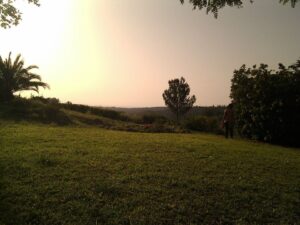🡄 (Previous category) :: 📁 Erev Shabbat |
⤷ You are here:
🖖︎ Prayers & Praxes —⟶ 🌞︎ Prayers for the Sun, Weekdays, Shabbat, and Season —⟶ Shabbat —⟶ Ḳabbalat Shabbat 🡄 (Previous category) :: 📁 Erev Shabbat 📁 Arvit l'Shabbat :: (Next Category) 🡆 Sorted Chronologically (old to new). Sort most recent first? Psalms 99, in Hebrew with an English translation. . . . Categories: Tags: Contributor(s): This interpretation and adaptation of Psalms 100 by Rabbi Zalman Schachter-Shalomi z”l, was first published in his Siddur Tehillat Hashem Yidaber Pi (2009). . . . Psalms 98, in Hebrew with an abridged translation. . . . Categories: Tags: Contributor(s): Psalms 97, in Hebrew with an abridged translation. . . . Categories: Tags: Contributor(s): Psalms 96 in Hebrew, with an English translation. . . . Categories: Tags: Contributor(s): Psalms 95, in Hebrew with an English translation. . . . Categories: Tags: Contributor(s): Psalms 93, in Hebrew with an abridged translation. . . . Categories: Tags: Contributor(s): Psalms 92, in Hebrew with an abridged translation. . . . An English translation of Psalms 92 set side-by-side with the Masoretic text. . . . Categories: Ḳabbalat Shabbat, Tehilim Book 4 (Psalms 90–106), Psuqei d'Zimrah/Zemirot l'Shabbat ul'Yom Tov, Saturday, Psalm of the Day Tags: Contributor(s): Psalms 29, in Hebrew with English translation. . . . Categories: Tags: Contributor(s): Rabbi Zalman Schachter-Shalomi’s translation of Psalms 29 was first published in Psalms in a Translation for Praying (Alliance for Jewish Renewal, Philadelphia: 2014), p. 45. . . . Rabbi Levi Weiman-Kelman introduced the tradition of reading these verses from Isaiah during the month of Kislev through the end of Ḥanukkah in his Siddur Ha’Avodah Shebalev of Kehillat Kol HaNeshamah (R’ Levi Weiman-Kelman, R’ Ma’ayan Turner, and Shaul Vardi, 2007). The translation provided here was adapted from the one made by Shaul Vardi in Siddur Ha’Avodah Shebalev. –Aharon Varady. . . . In siddurim following the nusaḥ ha-ARI z”l, the Barekhu call to prayer is immediately preceded by a passage from the Zohar, Parshat Terumah, explaining the profound significance of the Maariv service. . . . Categories: Tags: Contributor(s): This translation of the piyyut for Shabbat by Shlomo Al-Qabets can be found in HaAvodah SheBaLev – the Service of the Heart (Kehilat Kol HaNeshama, Jerusalem, 2007). . . . Categories: Tags: 16th century C.E., 54th century A.M., acrostic, Alphabetic Acrostic, לכה דודי Lekhah Dodi, פיוטים piyyuṭim, שבת shabbat Contributor(s): Ribon Kol Ha-Olamim is a teḥinah (supplication) for entering the Shabbat that can be found in many siddurim following after the custom of the school of Rabbi Yitsḥak Luria. In his Ha-Siddur Ha-Shalem, Paltiel (Philip) Birnbaum includes it, commenting as follows: “Ribon kol Ha’Olamim is attributed to Rabbi Joseph of Rashkow, Posen, who lived towards the end of the eighteenth century. The adjectives in the first paragraph are in alphabetic order.” This can’t be correct however as a copy of Ribon Kol Ha-Olamim can be seen in the siddur Tikunei Shabbat from 1614 (see below for source images). Google Books attributes Tikunei Shabbat to Rabbi Yitsḥak Luria (1534-1572), which is the attribution we have followed, although as a posthumously published work we wonder whether it might be more properly attributed to “the School of Rabbi Isaac Luria.” Please comment below if you know of another attribution. The English translation is that of Paltiel (Philip) Birnbaum, with some minor changes that I have made to divine names and appelations.– Aharon Varady . . . Categories: Tags: Contributor(s): The piyyut, Yedid Nefesh, in Hebrew with an English translation. . . . Categories: Tags: 16th century C.E., 54th century A.M., acrostic, בקשות Baqashot, Divine name acrostic, Openers, פיוטים piyyuṭim, rhyming translation, ידיד נפש Yedid Nefesh Contributor(s): A variation of the piyyut, Yedid Nefesh, in Hebrew with a creative English translation. . . . A variation of the piyyut Yedid Nefesh with a corresponding translation in Arabic. . . . Categories: Tags: 16th century C.E., 54th century A.M., בקשות Baqashot, Egypt, Egyptian Jewry, Needing Proofreading, Openers, פיוטים piyyuṭim, ידיד נפש Yedid Nefesh Contributor(s): A variation of the piyyut “Yedid Nefesh” in Hebrew with English translation. . . . Categories: Tags: 16th century C.E., 54th century A.M., acrostic, בקשות Baqashot, Divine name acrostic, Openers, ידיד נפש Yedid Nefesh Contributor(s): A variation of the piyyut “Yedid Nefesh” in Hebrew with English translation. . . .
Stable Link:
https://opensiddur.org/index.php?cat=657
Associated Image: (This image is set to automatically show as the "featured image" in shared links on social media.)
Terms of Use:
Be a mentsch (a conscientious, considerate person) and adhere to the following guidelines:
Additional Notes:
Support this work:
The Open Siddur Project is a volunteer-driven, non-profit, non-commercial, non-denominational, non-prescriptive, gratis & libre Open Access archive of contemplative praxes, liturgical readings, and Jewish prayer literature (historic and contemporary, familiar and obscure) composed in every era, region, and language Jews have ever prayed. Our goal is to provide a platform for sharing open-source resources, tools, and content for individuals and communities crafting their own prayerbook (siddur). Through this we hope to empower personal autonomy, preserve customs, and foster creativity in religious culture.
ויהי נעם אדני אלהינו עלינו ומעשה ידינו כוננה עלינו ומעשה ידינו כוננהו "May the pleasantness of אדֹני our elo’ah be upon us; may our handiwork be established for us — our handiwork, may it be established." –Psalms 90:17
| ||
Sign up for a summary of new resources shared by contributors each week
  |
